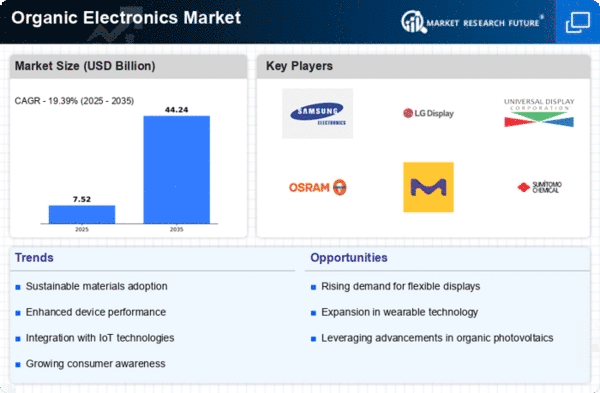Top Industry Leaders in the Organic Electronics Market

The Competitive Landscape of the Organic Electronics Market
The organic electronics market, with its promise of flexible, lightweight, and sustainable electronic devices, is enticing not just consumers but a diverse pack of players scrambling for a stake. Understanding the competitive landscape within this burgeoning field is crucial for navigating its complexities and identifying potential winners.
Some of the Organic Electronics companies listed below:
- Asahi Kasei Corporation
- AU Optronics Corporation
- BASF SE
- Bayer Material Science AG
- Evonik Industries
- Fujifilm Dimatix
- Merck Kgaa
- Novaled
- Samsung Display
Factors Shaping the Shareholder Game:
Beyond the usual suspects, several factors dictate market share dominance in the organic electronics realm. Firstly, material innovation is paramount. Companies that develop high-performance, cost-effective organic semiconductors and conductors stand to gain a significant edge. Sustainability also plays a crucial role, as consumers and regulators increasingly favor environmentally friendly alternatives. Companies embracing green strategies through material sourcing and production processes attract positive market attention.
Furthermore, manufacturing prowess is critical. Large-scale production capabilities and control over key processing steps provide a cost advantage and ensure consistent product quality. Finally, application diversification is crucial. Companies that tap into the wide range of potential applications, from medical sensors to smart textiles, are more likely to weather market fluctuations and maintain market share.
New Entrants and Rising Stars:
The organic electronics market is constantly attracting new players with innovative ideas and disruptive technologies. Start-ups like Polyera Corporation and Plastic Logic are developing printed electronics solutions for flexible displays and printed circuits, offering a low-cost alternative to traditional manufacturing methods. Meanwhile, companies like Gnarly Electronics are pushing the boundaries of biocompatible organic electronics for medical implants and wearable health monitors.
These emerging players, while not yet major market share holders, pose a significant threat to established players by catering to underserved segments and introducing disruptive technologies. Their agility and focus on specific applications allow them to gain traction quickly, forcing bigger players to adapt and innovate.
Latest Company Updates:
On Oct. 27, 2023, Calumet Electronics announced a $50,980,000 investment into the future mass production of organic substrates. The company is building organic substrates at prototype levels for defense and commercial applications. The investment is to scale this up and to do even more advanced technology. Calumet Electronics will be receiving a $7,500,000 grant to accomplish that goal.
On Jan. 27, 2023, Organic Electronics Technologies (OET) announced the start of a European-funded project aimed at developing and building an automated manufacturing production line for integrated printed organic photovoltaics in Thessaloniki, Greece. The Flex2Energy project, Automated Manufacturing Production Line for Integrated Printed Organic Photovoltaics, received €21.2 million in funding from the European Horizon research initiative.
On Dec. 29, 2022, Researchers at the University of Auckland announced the development of organic electronics for neurodegenerative diseases. This new organic electronic material class suits the bio-electronics field, where biology converges with electronics. The new materials are soft, flexible, stretchable, self-healing, and adhesive. The skin electronics can measure the patient's health, including muscle and heart activity. They can deliver the subtle electronic impulses currently used to treat neurodegenerative conditions like Parkinson's.
On Nov. 30, 2021, Kebotix (the US), a leading technology platform company, announced a strategic partnership with SCM (the Netherlands), a computational chemistry software company, to advance materials innovation. The collaboration is intended to enable Kebotix to help customers drastically scale up and computationally screen far greater quantities of molecules and materials, capitalizing on each other's areas of expertise to advance materials innovation.









